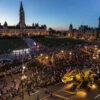The momentum Ottawa’s tourism industry gained during a record-breaking Canada 150 year appears to be carrying over into the first few months of 2018, industry officials told OBJ this week.
Hotel occupancy rates for the first quarter were very close to last year’s levels, when occupancy averaged 64 per cent, the city’s hotel association says. Meanwhile, Ottawa’s main downtown meeting space, the Shaw Centre, is slated to host 41 conventions this year – just one fewer than it welcomed in 2017.
Ottawa Tourism CEO Michael Crockatt said that so far at least, the city is staving off the dreaded “2018 hangover” that many industry observers feared after the region drew a record 11 million tourists last year.
(Sponsored)

Local businesses face hiring obstacles due to immigration pullback, flawed screening
In his 39 years of practicing immigration law, Warren Creates (a rare Law Society Certified Specialist) has never seen an environment so challenging for employers looking to hire workers from

Local businesses face hiring obstacles due to immigration pullback, flawed screening
In his 39 years of practicing immigration law, Warren Creates (a rare Law Society Certified Specialist) has never seen an environment so challenging for employers looking to hire workers from
“It’s very encouraging,” Crockatt said. “What we were prepared for was a little bit of a letdown (after 2017), but we certainly weren’t hoping for one. Here we are now, five months into the year, and our numbers are still looking very, very positive. We’re still looking like we’re holding our own versus 2017, which is fantastic.”
$1 million for major events
The city announced this week it was boosting its investment in the Major Events Fund, which Ottawa Tourism uses to attract big-ticket spectacles to the capital. The city already contributes $1.5 million a year to the fund and will now add another $1 million to that total for 2018.
The money will come from the new four per cent accommodation tax that was imposed on all hotels in the capital on Jan. 1. The tax replaced a voluntary three per cent levy that about half the city’s lodgings had been charging visitors for several years.
The city will also pump about $500,000 in revenue from the tax into the Convention Development Fund. Ottawa Tourism and the Shaw Centre draw on the fund to lure corporate and international conventions to the region.
The old voluntary hotel levy raised about $8 million a year, most of which went toward Ottawa Tourism’s marketing efforts. The new tax is expected to raise as much as $12 million annually, city officials say.
“This new funding is really going to enable us to bid even more, win even more and host even more events here in the city,” Crockatt said.

Industry officials are “working actively” to bring back successful Canada 150 events such as La Machine and Red Bull Crashed Ice in future years, he added, and “funds like this are going to help us do that.”
Another popular attraction from last year, the Canada Welcomes the World cultural festival, has already confirmed it will be back in 2018 with a slightly different format.
Instead of individual countries being showcased on various weekends through the year, the 2018 version will feature a single celebration of various nations’ cultures on the Canada Day long weekend from July 1-3 at Lansdowne Park’s Horticulture Building.
Airbnb signs on
Meanwhile, one of the world’s most popular online home rental services says it will start charging a four per cent tax on all its Ottawa listings this summer.
Airbnb says it will require all guests at its 3,000 active hosts in the city to pay the tax as of Aug. 1. Although Ottawa is the first municipality in Ontario to have such a tax, the company has already been charging a 3.5 per cent levy on all its listings in Quebec and is in talks to impose a similar tax in British Columbia.
Airbnb estimates the tax could generate between $300,000 and $360,000 a year, which will go to the city.
“We think it’s important to contribute to the tax base,” said Alex Dagg, Airbnb Canada’s director of public policy. “This is a reasonable tax. It makes sense.”
Airbnb hosted 185,000 guests in Ottawa in 2017, and the company estimates the city would have collected about $850,000 from the tax last year.
But Wendy Stephanson, Ottawa’s deputy city treasurer of revenue, suggested that figure was an anomaly due to the huge number of visitors for Canada 150.
“Looking forward, we’re going to temper that number a little bit,” she said. “We’re going to monitor it and just wait and see what happens over time.”
It will be up to council to decide what to do with the Airbnb revenue, she said. The new agreement is separate from the hotel tax, so the money likely won’t go to Ottawa Tourism, she added.
“This is a toe in the water for
– Steve Ball, Ottawa Gatineau Hotel Association
Steve Ball of the Ottawa Gatineau Hotel Association said he’s happy Airbnb has agreed to the tax, although he says hoteliers are still looking for assurances that the company is paying its fair share of corporate taxes and that its hosts are paying HST and tax on the extra income they generate from renting out rooms.
“This is a toe in the water for levelling the playing field,” he said.
Dagg countered that Airbnb pays all the taxes it’s required to, adding most of its hosts don’t earn enough from renting out rooms to reach the $30,000 annual threshold for remitting HST.
“In my view, it’s a red herring,” she said of the hotel industry’s complaints.




